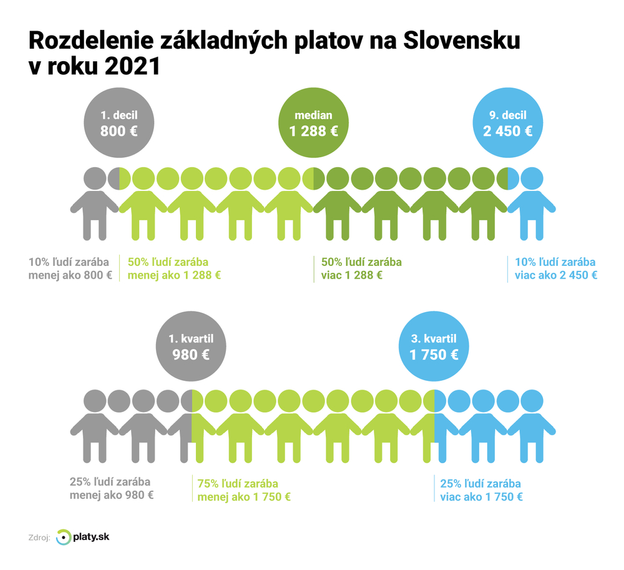The median salary in Slovakia amounted to €1,288 gross in 2021. This means that 50 percent of people working in the country had a lower basic salary, as stems from a recent analysis of the Platy.sk website, which runs under the Profesia recruitment company.
In addition, one in 10 Slovaks earned less than €800 last year. Of this figure, those who do not have children and did not use the non-taxable part of the tax base received a monthly net salary of less than €632.
On the other hand, one in 10 Slovaks had a salary exceeding €2,450 gross. These people earned more than €1,790 net a month if they had no children and did not use the non-taxable part of the tax base.
Regional differences
The comparison of salary medians in regions showed a big difference between the capital and the rest of Slovakia.
While in Bratislava and its surroundings, about half of its people earned less than €1,520, the median in other regions oscillated between €1,000 (Prešov Region) and €1,200 (Trnava Region).
In Prešov Region, only 10 percent of employees with the highest salary earned more than €1,600 gross. In Bratislava, those receiving the highest salaries earned more than €2,950.
Higher education widens the gap
The regional differences are even deeper in the case of employees with a university education.
About half of such employees in Bratislava Region had salaries lower than €1,750 gross last year, while in Prešov Region, the median was only about €1,100 gross. The closest region to the Slovak capital in this respect is Košice, where the salary median of university-educated employees amounted to €1,620 gross last year.
Profesia's statistics suggest that Košice Region has the second-highest number of job offers requiring a university education, after Bratislava. One of the reasons the salary median is so high might be that up to one-third of the offers in the region are IT-related.
In Bratislava, IT job offers represent only 23 percent of all job offers requiring a university education.
As for secondary school education, the gaps also remain quite big. This is not the case for jobs where secondary education without a school-leaving exam (maturita in Slovak) is required.



 Illustrative stock photo (source: Sme)
Illustrative stock photo (source: Sme)
 The salary medians in Slovakia (source: Platy.sk)
The salary medians in Slovakia (source: Platy.sk)